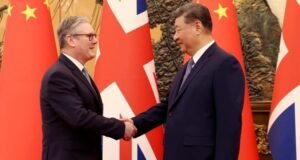
Reuters is uncomfortable alerting us to China’s space-tech partnerships in Africa without also clucking, in an unelaborated aside, about how the United States under Trump is now “slashing help for developing countries.” Its report neglects to mention the problems being uncovered in USAID expenditures by Elon Musk’s Department of Government Efficiency (“China builds space alliances in Africa as Trump cuts foreign aid,” February 11, 2025).
On January 20, 2025, the new U.S. president issued an executive order stating that “The United States foreign aid industry and bureaucracy are not aligned with American interests and in many cases antithetical to American values. They serve to destabilize world peace by promoting ideas in foreign countries that are directly inverse to harmonious and stable relations internal to and among countries.” And, therefore, that foreign aid (with some exceptions) was being put on a 90-day pause while sundry assistance programs were reassessed. As I write, we’re in the fourth week of Trump’s new term.
Is leaving the flow of U.S. misspending intact and uninterrupted the only way to counter the influence of China?
On the other hand, the Reuters report also contrasts U.S. involvement or lack of involvement in African space programs over decades with China’s growing involvement in Africa. But to the extent that this is the difference being considered, it was not one precipitated by the Trump administration’s January 20, 2025 pause in foreign aid expenditures.
Not Africa-made
Despite Reuters’s gibe, the article provides important information about its actual topic.
On the outskirts of Cairo, a cutting-edge space lab was supposed to be the first in Africa to produce homegrown satellites. Step inside the plant, though, and the made-in-Africa image begins to fade….
The Egyptian satellite lab is the latest advancement in China’s secretive overseas space program…. China has publicly announced much of this space assistance to African countries, including its donations of satellites, space monitoring telescopes and ground stations. What it hasn’t discussed openly, and which Reuters is reporting for the first time, is that Beijing has access to data and images collected from this space technology, and that Chinese personnel maintain a long-term presence in facilities it builds in Africa….
Egypt, a major recipient of U.S. military aid, is not the only country in Africa being drawn into China’s orbit. Beijing has 23 bilateral space partnerships in Africa, including funding for satellites and ground stations to collect satellite imagery and data, according to the United States Institute of Peace, a think tank. In the past year, Egypt, South Africa and Senegal agreed to collaborate with China on a future moon base, a project that rivals the United States’ own lunar plans.
Reuters may be the first to report as verified fact China’s sticking around in China-built space-tech facilities in Africa and China’s access to surveillance data collected by China-developed satellites and other tech in Africa. Others have doubtless conjectured that this has been happening; the pattern is familiar.
Indeed: “The Pentagon says China’s space projects in Africa and other parts of the developing world are a security risk because Beijing can hoover up sensitive data, enhance its military capabilities and coerce governments if they become locked into China’s communications ecosystem.”
A China National Space Administration spokesman, though, says that despite its data-sharing agreements with countries, China “ ‘has never, and will never’ use images and data [obtained thereby] to enhance its military surveillance capabilities.” What a relief.
Neutral?
Another insight of the report is that many natives involved in these projects affect to see no difference worth considering between China and the United States as potential collaborators or benefactors. The Africans may say that they’re “neutral.”
An example is Sherif Sedky, head of the Egyptian Space Agency, who judges that an assembly facility and the MisrSat-2 satellite “were ‘donations’ from China and nothing was expected in return. Sedky said data from Egypt’s satellites belongs to and is controlled by Cairo.”
On the other hand, the Egyptian Space Agency “did not respond to questions about whether China also has access to the satellite data.” Which would be something in return.
“We are neutral, we deal with everybody,” Sedky says. “If we get an offer, we take it.”
Also see:
StoptheCCP.org: “Can the United States Fend Off China (and Russia) in Space?”











